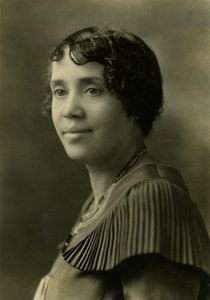Elizabeth Fouse facts for kids
Quick facts for kids
Elizabeth Fouse
|
|
|---|---|
 |
|
| Born | May 14, 1875 |
| Died | October 22, 1952 |
| Alma mater | University of Cincinnati |
| Spouse(s) | William Henry Fouse (m. 1898) |
Elizabeth "Lizzie" Beatrice Cooke Fouse (born May 14, 1875 – died October 22, 1952) was an important woman from Kentucky. She worked hard to achieve fairness and equal rights for African American women. She did this both in her local community and across the country.
Elizabeth Fouse started and led many groups. Her main goal was to stop unfair treatment against people. Her strong Christian faith guided her work in social and church groups.
Contents
Early Life and Education
Elizabeth Fouse was born in Lancaster, Kentucky. Her parents were William and Mary (Kennedy) Cook. She was their only child. Her family raised her in the Baptist church.
Fouse grew up in Lexington, Kentucky. She went to Simmons University and Eckstein-Norton University. Later, she graduated from the University of Cincinnati.
Teaching Career
Elizabeth Fouse began teaching in 1893. She taught at a high school in Corydon, Indiana. This school was separate for Black students. She also taught handwriting to white students. She even played the clarinet in a band. She was the only Black person in that band.
On August 10, 1898, she married William Henry Fouse. He was a school principal.
Fighting for Equality
Elizabeth Fouse was very active in the National Association of Colored Women (NACW). This group worked for the rights of Black women. She became the President of the Kentucky Association of Colored Women (KACW).
While leading the KACW, Fouse created a scholarship fund. This fund helped students pay for their education. She kept this fund going for over 40 years. Records from the NAACP show she was a main contact for the Lexington, Kentucky chapter.
Leading Community Groups
In 1920, Fouse started the Phyllis Wheatley Y.W.C.A.. This organization helped young women. She also held leadership roles in many other groups. These included the Acme Art and Culture Club and the Women's Improvement Club. She also led the Day Nursery and the Women's Auxiliary of the Emancipation League.
Fouse believed in helping people help themselves. She encouraged self-reliance and good behavior. Her work helped Black women develop leadership skills. It also built strong community groups. These groups helped the Black community survive racism. They also helped them demand their rights.
Temperance Movement Work
Another important part of Fouse's work was the temperance movement. This movement worked to reduce alcohol use. The Kentucky Woman's Christian Temperance Union (KWCTU) held its first meeting in Lexington in 1881. At first, African American women could not join.
However, in 1905, the KWCTU asked local groups to create branches for African American women. In 1907, the new Lexington Negro Woman's Christian Temperance Union opened a school. This school was for Black children. It offered a day nursery and job training.
Fouse also led the Lexington Sojourner Truth WCTU. In 1945, all the Black branches formed their own group. It was called the Kentucky Sojourner Truth Woman's Christian Temperance Union. Elizabeth Fouse became its president.
Other Important Roles
Elizabeth Fouse was a member of the Zeta Phi Beta sorority. This is a Greek-letter organization for women.
She was also a leader in the Woman's Convention. This group brought together women from Baptist churches. They worked on charity projects and missions. She joined Church Women United in 1941. This group included women from different church organizations.
In 1944, Governor Simeon Willis asked Fouse to join a special group. This group was called the Kentucky Commission for the Study of Negro Affairs.
See also

